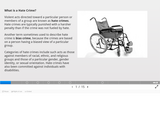
Hate Crimes Slideshow
- Subject:
- Career and Technical Education
- Criminal Justice
- Material Type:
- Interactive
- Provider:
- Michigan Virtual
- Date Added:
- 07/29/2019

Hate Crimes Slideshow
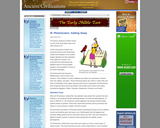
The Phoenicians lived along the Mediterranean coast in what is now Lebanon. They inhabited a number of different city-states, the most famous of which were Tyre, Byblos, and Sidon. These Phoenician places were often in conflict with each other for domination of the region. Because of this lack of cooperation, the Phoenicians were conquered and forced to pay tribute to the virtually every empire in the region, including the Egyptians, Hittites, Assyrians, Babylonians, Persians, and Greeks.

Three years after the Supreme Court declared race-based segregation illegal, a military showdown took place in Little Rock, Arkansas, when nine black students attempted to attend the all-white Central High School on September 3, 1957.
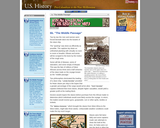
Some will die of disease, some of starvation, and some simply of despair. This was the fate of millions of West Africans across three and a half centuries of the slave trade on the voyage known as the "middle passage."

When immigrants reach a new land, their old ways die hard. This has been the case with most immigrant groups to the New World. The language, customs, values, religious beliefs, and artistic forms they bring across the Atlantic are reshaped by the new realities of America and, in turn, add to its fabric. The rich traditions of Africa combined with the British colonial experience created a new ethnicity the African American.
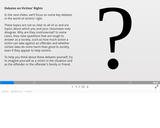
Debates on Victims’ Rights Slideshow
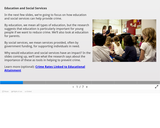
Education and Social Services Slideshow
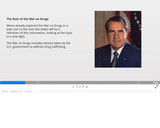
War on Drugs Slideshow
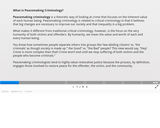
Peacemaking Criminology Slideshow
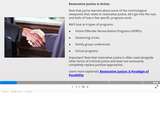
Restorative Justice Slideshow
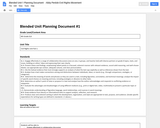
This 8th grade unit highlights main events of the Civil Rights Movement and navigates to the life of Jackie Robinson and watching the movie 42.
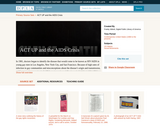
This collection uses primary sources to explore AIDS activism during the 1980s. Digital Public Library of America Primary Source Sets are designed to help students develop their critical thinking skills and draw diverse material from libraries, archives, and museums across the United States. Each set includes an overview, ten to fifteen primary sources, links to related resources, and a teaching guide. These sets were created and reviewed by the teachers on the DPLA's Education Advisory Committee.
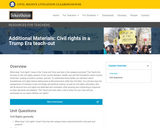
What does “civil rights” mean in the Trump era? How and why is the category evolving? This Teach-Out focuses on the civil rights aspects of two current debates–health care and the President’s seven-country travel ban–looking at politics, protest, and law. To understand these better, you will learn about foundational civil rights history dating back to Reconstruction (after the Civil War). You will also hear the perspectives of scholars in law, sociology, and political science, as well as civil rights advocates, who will all discuss how civil rights are defended and contested, often growing and contracting in response to other demands and debates. This Teach-Out ends with a call to action for you: How will you participate as our nation defines our rights?
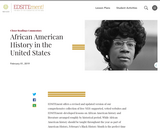
In this special revised and updated feature for Black History Month, teachers, parents, and students will find a collection of NEH-supported websites and EDSITEment-developed lessons that tell the four-hundred-year old story of African Americans from slavery through freedom and citizenship to the presidency.

Alcatraz is home to one of the world's most infamous prisons. From the 1930s to 1960s, Alcatraz was the premier maximum security prison, housing inmates such as Al Capone and George Machine Gun Kelly. Before the prison was created, the island was home to American Indians. Today, it is one of San Francisco's most prominent tourist attractions.
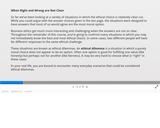
Ethical Problems in the Workplace

Personal vs. Business Ethics
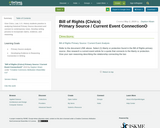
Give Civics, Law, U.S. History students practice in analyzing historical Primary Source document and connect to contemporary news. Develop writing process to incorporate claims, evidence, and reasoning.

This learning object will give your students an opportunity to think critically about the bill of rights in real life situations and leverage technology in such a way that they can learn in a fun and engaging way. The students will begin by studying the Bill of Rights at the link below, then the class will play the Kahoot Quiz online using any digital device with an internet connection. The quiz will require the students to read a real life situation and choose which of the ten amendments of the Bill of Rights is associated with that right. Critical thinking and application of skills will be required to win the game. Students could then be asked to join Kahoot and create their own Bill of Rights quiz game.
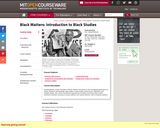
Interdisciplinary survey of people of African descent that draws on the overlapping approaches of history, literature, anthropology, legal studies, media studies, performance, linguistics, and creative writing. This course connects the experiences of African-Americans and of other American minorities, focusing on social, political, and cultural histories, and on linguistic patterns.